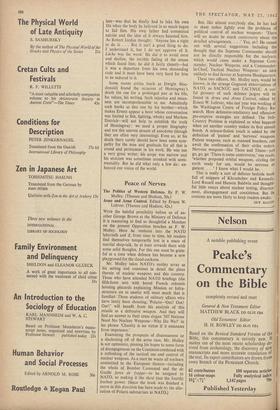Peace of Nerves
Arms and Arms Control. Edited by Ernest W. Lefever. (Thames and Hudson, 42s.)
WITH the baleful possibility before us of an- other George Brown at the Ministry of Defence it is reassuring to find so thoughtful a Member on the present Opposition benches as F. W. Mulley. Here he ventures into the NATO labyrinth and if, from time to time, his readers find themselves temporarily lost in a maze of martial shop-talk, he at least rewards them with some solid thoughts. For this one must be grate- ful at a time when defence has become a new playground for the cloud-cuckoos.
Mr. Mulley takes NATO's motley array as his setting and examines in detail the place therein of nuclear weapons and this country. Those who have attended NATO briefings (the fifth-form sort with bored French colonels hoisting placards explaining Mission or Infra- structure on to easels) will meet much that is familiar. Those students of military affairs who have lately been shouting, 'Polaris—Out! Out! Out!' will benefit from his analysis of this missile as a defensive weapon. And they will find an answer to their crass slogan '107 Nations Need No Nuclear Weapons—Why Do We?' in his phrase 'Chastity is no virtue if it emanates from impotence.'
Examining the prospects of disarmament or a slackening off of the arms race, Mr. Mulley is not optimistic, pinning his hopes to some form of disengagement on the Continent combined with a rethinking of the tactical use and control of nuclear weapons. As a start he wants all nuclears committed to the European theatre—including the whole of Bomber Command and the de Gaulle force de frappe—to be assigned to NATO, so making it the third (not the fourth) nuclear power. (Since the book was finished a move in this direction has been made by the allo- cation of Polaris submarines to NATO.)
But, like almost everybody else, he has had to skate rather lightly over the problems of political control of nuclear weapons : `There will no doubt be much controversy about the detailed arrangements. . . .' Yes, sir! He comes out with several suggestions including the thought that the Supreme Commander should not be directly responsible for the nuclears, which would come under a Supreme Com- mander, Nuclear Weapons, and a Commander- in-Chief, Tactical Nuclear Weapons: an idea unlikely to find favour at Supreme Headquarters.
These two officers, Mr. Mulley says, would be known, in the strange Gugnunk abbreviations of NATO, as SACNUC and TACTNUC. A use- ful glossary of such defence jargon will be found in Arms and Arms Control, edited by Ernest W. Lefever, who last year was working at the Washington Centre of Foreign Policy Re- search. Here defensive-retaliatory and offensive- pre-emptive strategies are defined. The Nth- Country Problem is explained as what happens when yet another country makes its first atomic bomb. A science-fiction touch is added by the definition of 'patient' and 'nervous' weapons. Patient weapons, such as manned bombers, can await the confirmation of their strike orders. Nervous weapons—like Thors and Titans—just go, go, go. 'There is some controversy,' one reads, 'whether proposed orbital weapons, circling the earth ready for use, would be nervous or patient. . . I know what I would be.
This is really a sort of defence bedside book full of snippets of Khrushchev and Kennedy, Lord Russell and Hanson Baldwin and thought- ful little essays about nuclear testing, disarma• ment, disengagement and coexistence. But its contents are more likely to keep readers awake.






































 Previous page
Previous page